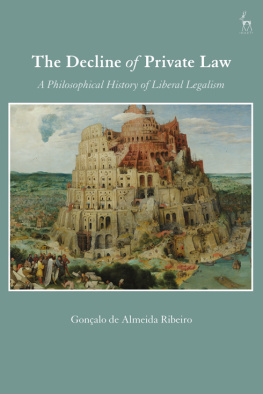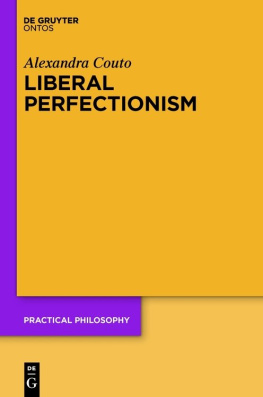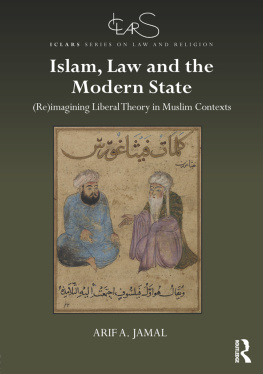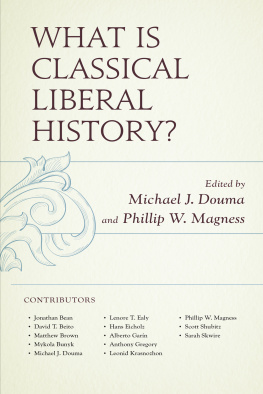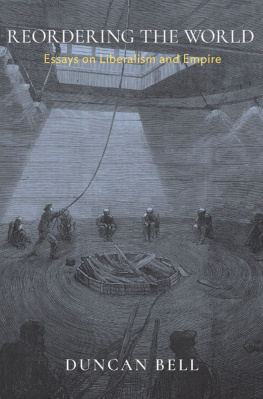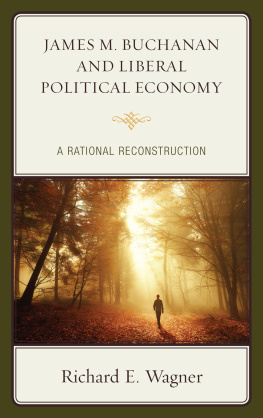TABLE OF CONTENTS

THE DECLINE OF PRIVATE LAW
This book is a large-scale historical reconstruction of liberal legalism, from its inception in the mid-nineteenth century, the moment in which the jurists forged the alliance between political liberalism and legal expertise embodied in classical private law doctrine, to the contemporary anxiety about the possibility of both a liberal solution to the problem of political justification and of law as a respectable form of expert knowledge. Each stage in the history is a moment of synthesis between a substantive and a methodological idea. The former is the liberal political theory of the period, purporting to provide a solution to the problem of political justification. The latter is a conception of legal method or science, supposedly vindicating the access of the expert to the political choices embodied in the law. Thus, each moment in the history of liberal legalism integrates a political theory with a jurisprudential conception. Although it reaches the unsettling conclusion that liberal legalism has largely failed by its own standards, the book urges us to avoid quietism, scepticism, or cynicism, in the hope that a deeper understanding of the fragility of our values and institutions inspires a more thoughtful, broadminded, and nurtured citizenship.
The Decline of Private Law
A Philosophical History of Liberal Legalism
Gonalo de Almeida Ribeiro

The junzi considers the whole rather than the parts.
The small man considers the parts rather than the whole.
The Analects of Confucius, 2.14
This book is based on the dissertation I successfully defended at Harvard Law School in September 2012, in partial fulfilment of the requirements to be awarded a doctoral degree. As often happens when the author of an academic thesis is slow to move towards publication, I nearly let go of it. It was my good fortune that when I did make a move, in late 2015, I found in Hart Publishing, and particularly in its then Commissioning Editor Bill Asquith, enthusiastic support for the project.
My appointment to the Constitutional Court in July 2016 delayed the process of publication even further, and indeed it threatened to stall it indefinitely. Fortunately, in the summer of 2018 I was able to carry to the end the task of editing and polishing the manuscript. I am grateful to the current Commissioning Editor of Hart Publishing, Kate Whetter, and to Production Editor Linda Staniford, for their support in the latter stages of this stormy journey.
Notwithstanding my belief that the manuscript withstood fairly well the test of time, this book is undoubtedly different from the dissertation on which it is based. I rewrote the Prologue and the Epilogue; divided the last chapter of the thesis into two, rewriting a good deal of what is now chapter five; excised the original text of material that struck me as digressive, pedantic, or downright silly; and revised the whole manuscript as thoroughly as limited time, energy and ability allowed. To be sure, the main thrust, the bulk of the writing and the background research are the same. But what I now offer to the reader is the leaner, neater and crisper work of a more mature scholar and writer.
Over the years, a large number of generous scholars read parts of the manuscript in some form or shared with me their thoughts about themes and arguments in this book. On that score, I am indebted to Adilson Moreira, Ana Taveira da Fonseca, Andr Salgado de Matos, Antnio Arajo, Antnio Corts, Antnio Hespanha, Armando Rocha, Axel Gosseries, Catarina Santos Botelho, Daniel Vargas, Dennis Patterson, Elsa Vaz de Sequeira, Fernando S, Filipa Calvo, Frank Michelman, Giovanni Marini, Hans-W Micklitz, Henrique Antunes, Holger Spamann, Hugh Collins, Ingo Sarlet, Jan Dalhuisen, Joo Gama, Joaquim Pedro Cardoso da Costa, Jorge Azevedo Correia, Jorge Gonzlez-Jcome, Jorge Mattamouros, Jorge Pereira da Silva, Jos de Sousa e Brito, JHH Weiler, Jos Lamego, Jos Teles Pereira, Jlio Gomes, Karl Klare, Ken Winston, Lewis Sargentich, Louis Kaplow, Lus Pereira Coutinho, Lus Roberto Barroso, Marcos Keel Pereira, Maria-Rosaria Marella, Matej Accetto, Miguel Galvo Teles, Miguel Nogueira de Brito, Miguel Morgado, Mikhail Xifaras, Mitch Lasser, Neil Walker, Nimer Sultany, Nuno Garoupa, Patrcia Fragoso Martins, Paulo Mota Pinto, Pedro Fortes, Pedro Garcia Marques, Pedro Lomba, Pedro Machete, Pedro Mrias, Pedro Velez, Ravi Afonso Pereira, Richard Fallon, Rita Lynce de Faria, Roni Mann, Rui Pinto Duarte, Rui Ramos, Talha Syed, Tiago Macieirinha, Tito Rendas, Vishaal Kishore and Wim Decock. Joe Singer and Mattias Kumm, who read the whole manuscript in its dissertation form and gave me extensive feedback, belong in a distinguished category of their own.
I owe a special debt of gratitude to Jorge Braga de Macedo, Lus Barreto Xavier, Maria da Glria Garcia, Maria Lcia Amaral, Miguel Poiares Maduro and Rui Medeiros, for having played, in one way or another, a decisive role in my academic career.
I dedicate this book to Duncan Kennedy, my former teacher and supervisor. In spite of our occasional differences of thought and style, this book is, as careful readers will not fail to notice, a progeny of Duncans towering legacy in the fields of legal theory, legal history and comparative law. The dedication is my modest but heartfelt tribute to that intellectual pedigree, and to several years of captivating and enlightening mentorship.
Gonalo de Almeida Ribeiro
Lisbon
Imagine that you are a political official. You claim authority over other people, and your authority is enforceable. Now, if you are a reflective person, you will ask yourself the following question: What right do I have to coerce others to abide by my say-so? Put at its briefest, that is the problem of political justification.
There were times in which the solution to that problem was straightforward. To the slave-owner, or the pater familias, the question of political justification did not even occur; his mastery over the slave, or over the members of the household, is not a matter of right but of violence settled de facto as opposed to de jure.
I should clear at once a potential misunderstanding. It is possible, indeed very likely, that in the course of history a considerable number of slave-owners, manorial lords and enlightened despots experienced anxiety or even lost faith in their authority. But we should be careful not to trade on confusion between the individual and the role, the actor and the mask. It is a key part of the social plot of slavery, lordship and enlightened absolutism that the characters of slave-owner, manorial lord and enlightened despot take their political authority for granted. That says nothing, of course, about the experience and moods of particular performers; comedians so goes a show business clich are often depressed.
To the contemporary official, however, the question of political justification appears under a very different light. (I must insist that by the official I mean the character and what concerns me is the reasoning process that is to be expected from him. What goes on backstage in the minds of the individual holders of office is none of my business.) What distinguishes him from other well-known political characters in history is that he cannot vindicate a putative right to rule in his status. He must regard those subject to his authority as equals both among themselves and with himself. Under these conditions, which furnish the normative environment of our political culture, it is much harder to figure out what justifies political authority. For political authority appears to imply by its very nature precisely the inequality of status that our egalitarian political culture deplores.

